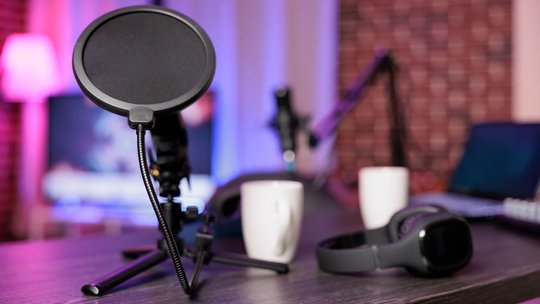Blog
How to Promote a Podcast: 23 Podcast Marketing Tips and Strategies

Published 7/15/2024 by Babalola Alabi
PodcastingPodcasting is an great activity for anyone, especially if you want to talk about something you really love. But it’s one thing to start a podcast and it’s another to make your audience listen to your voice.
With over 5 million podcasts out there, it looks almost impossible to get your voice to your audience especially if it’s a new podcast. However, with the right podcast marketing strategies, you can outrun existing podcasts and become the face of your niche.
So the real question now is, what are the best marketing strategies for promoting your podcast?
This piece will answer all your questions regarding podcast marketing and also give you different options on how to promote podcasts.
How to Promote a Podcast: 23 Podcasting Marketing Strategies and Tips
An unpopular fact: podcast promotion is not a process you do after creating your podcast. Your promotion process starts with the creation of your podcast. As your podcast evolves, your podcast marketing and promotion should follow suit.
For this reason, we have divided our 23 podcast marketing strategies and tips into three phases; podcast production, optimization and marketing. This guide is for beginners wondering how to promote a new podcast and pros who have started already.
Podcast Production Phase
The best way to start promoting is by planning a successful podcast to create quality content for your audience. You can’t promote a product or service that is bad.
Sometimes, your biggest podcast promotion ROI may come from listeners who enjoy your podcast and share it with their friends and families. That free PR is called word-of-mouth marketing. No amount paid, no contract signed, just your audience being your podcast ambassador for free. It’s as simple as your audience saying “Hey Rane! I found this really amazing podcast on marketing and branding that you’ll love”. And like that, you have a new listener.
In the podcast production phase, here are the marketing strategies you should take into consideration:
1. Create podcast content for your audience
As obvious as this may sound, many podcasters have lost their credibility and sauce from the beginning because of their content, style, and format. Podcasts have different formats and it’s best to choose the one that suits your audience type better to retain them longer. Understanding their interests, needs, and preferences can help you produce episodes that resonate deeply with them.
It’s not a bad idea to create your podcast format but you still have to research the best podcasts and podcasters in your niche to check which format works better. If you’ll need to host podcast guests every episode, prepare for that and get the best guests for your audience. If it’s solo podcasting, structure your content appropriately to make every segment flow into each other seamlessly. Don’t use slangs and informal words when speaking to professionals and avoid using technical jargon when speaking to non-professionals.
These personalized approaches will not only make your content more relatable and engaging but also encourage word-of-mouth promotion because satisfied listeners are more likely to recommend your podcast to their peers. That is the first way to promote your podcast effectively.
Recommended: How to start a podcast (step-by-step guide)
2. Speak clearly
Clear speech allows listeners to easily understand and engage with your content. It’s similar to a writer creating content in clear and understandable grammar. Additionally, it helps in building credibility and professionalism. Listeners will easily view you as a reliable and credible source of information when they can easily follow your dialogue without straining to understand.
3. Reference old podcast content
You have probably heard a podcaster say “I spoke more on this topic in episode X of this podcast, check it out”. That’s one way of marketing your podcast. Referencing old podcast content leverages the value of your existing episodes to attract new listeners and re-engage your current audience. For instance, if you have a series on entrepreneurship, you can reference an insightful interview with a successful startup founder when discussing related topics in newer episodes. You can always work out your podcast script to refer to an old podcast in every new episode you create.
4. Use the right podcast tools

The quality of your video or audio depends largely on the tools you use. Choosing the right podcast tools and equipment can simplify recording, editing, and enhancing your content. Microphones, headphones, audio mixers, and cameras should be on point and working perfectly. SaaS tools and softwares like Riverside, Audacity, and Descript help you record and edit your content. Other tools like SoundMadeSeen help you promote your content effectively by producing clips and short videos you can upload to social media to gain more reach.
With SoundMadeSeen, you don’t have issues creating videos for your social media accounts as the tool creates clips for different social media platforms like TikTok, Instagram Reels, and YouTube Shorts. Some SoundMadeSeen unique features include;
- Seamless podcast to video conversion.
- Clips generation for social media
- Simple video interface for beginners and pros
- Image generation and accurate audio analysis.
- Quick content generation for your blog, show notes social media caption, and many more.
Podcast Optimization Phase
After creating your podcast episode and content, it’s time to optimize your audio, video, and written content for visibility and reachability.
5. Create written content for your podcast
Search engines like Google find it challenging to analyze and interpret audio content which is why opting for written content is great. Written content leverages reach and searchability because search engines can easily understand texts. If your text has the necessary keywords, describes your audio content effectively, and implements podcast SEO, there is a high chance of being easily discoverable on search engines.
Optimizing your podcast with written content also involves adding features like captions, transcripts, and show notes. Detailed show notes with timestamps and quotes enhance the listener experience while subtitles make your audience access and consume your content easily.
6. Research and use the right keywords
You want your audience to find your show easily? Add the right keywords. Keywords are words or phrases in a search query that your audience type on Google to start a research. For example, a listener interested in real estate management and is actively looking for a podcast that talks about it might type “real estate management podcast” or “podcasts on real estate management”. If your podcast has any of these keywords, there is a high chance it ranks higher on search engines which is a win for you. To choose the right keyword;
- Start by getting your topic and creating a list of keywords relating to the topic. You can use free tools like SEO Mator and Mangools or paid ones like Semrush and Ahrefs for keyword research. Make sure you’re targeting keywords with high volume but low keyword difficulty.
- Add your keywords to your content naturally. Spread the keywords over episodes adding the keywords as needed.
- Add the keywords to your written content like show notes and description. Don’t spam and stuff the content with keywords all over thinking it’d make Google rank it high. Keyword stuffing attracts penalties.
7. Optimize your audio quality
Another thing to optimize to increase your podcast listeners and promote your podcast better is your audio quality. When your audio is clear, well-balanced, and free of distracting noises, it creates a professional and polished impression. It also lets your content shine and ensures that your message and personality are conveyed effectively without technical distractions.
8. Optimize your podcast length
“How long should a podcast last?” Although there have been several statistics on this issue, the ideal answer to this depends on your podcast. For example, you probably will not spend as much time on an episode as a guest podcaster does if you’re a solo podcaster. This also extends to niches, your podcast guest and other factors. Podcast length can be categorized into four:
- Short & Sweet (Under 15 minutes): Ideal for daily news updates, quick tips, or short discussions.
- The Sweet Spot (20-40 minutes): This range is popular because it's a manageable length for most listeners and allows you to cover a decent amount of information without feeling overwhelmed.
- Deep Dives (45 minutes - 1 hour): Good for complex topics with interviews, analyses, or narrative storytelling that needs more time to develop.
- Extended Discussions (Over 1 hour): Podcasts like "The Joe Rogan Experience" prove that longer formats can be successful, especially for discussions on intricate topics with a dedicated listener base.
9. Create a website for your podcast
Creating a website is another working strategy for promoting your podcast. It centralizes your content, engages with the audience differently, and makes discoverability easier and faster. If you have a business and your reason for starting a podcast is to advertise your product or service, create a landing page on your website specifically for the podcast. And if you don’t have a website, create one. Integrate social media sharing options and analytics tools to track engagement and refine your promotional strategies. This approach also builds a stronger brand presence and deeper listener relationships.
10. Consider podcast SEO
Speaking of visibility and discoverability, podcast SEO is the backbone to achieving this and it is one way to grow your podcast without ads. Optimizing your podcast titles, descriptions, and episode transcripts with relevant keywords can attract listeners who are searching for content in your niche. Also, making sure the backend of your website and your content structure align with the SEO standards can be of huge benefit to your website. Preferably, hire an SEO expert to help you with your website SEO.
11. Create blog content from your podcast transcripts
Repurposing your content is another podcast promotional strategy that can help you increase your reach. In this case, you are targeting an audience different from your normal podcast listeners or viewers. For example, if your podcast episode featured an interview with a renowned expert in your field, you can repurpose the transcript into a blog post. Highlight the key insights and quotes that might attract readers who prefer written content over audio or video.
Luckily for you, converting your podcast to blog content has become easier and can be done within a few minutes. SoundMadeSeen helps podcasters like you analyze their audio or video easily, generate transcripts, and automatically get blog content.
Overall, repurposing your podcast into blog posts provides valuable content to your audience in multiple formats, satisfies different preferences, and expands your overall impact.
Podcast Marketing Phase
Now that you’ve created amazing content, optimized it, and set the foundation for effective marketing and promotion, let’s talk about other strategies that can help you publicize and promote your podcast.
12. Take advantage of PR from your podcast guests
If you are having a podcast guest especially one with a large audience on social media, it is advisable to leverage free PR from them. How? Invite them to your podcast and make them issue a statement similar to a vote of confidence.
Inviting a guest to your podcast means inviting the guest’s audience as well. Now that you have your guest, encourage them to inform their audience about their upcoming interview with you. Send them promotional packages as gifts such as:
- Your logo, merch, and artwork
- Amazing quotes they said during the interview
- Social media post ideas, hashtags and captions they can use to promote your work.
13. Cross-promote yourself on different podcasts
Another podcast promotional strategy you might not know is cross-promotion. This involves strategically aiming to be mentioned or featured on another podcast with a similar target audience. This helps you leverage the audience of the podcast and drive organic waves of listeners and audience to your podcast. You can have a conversation with a co-podcaster in your niche, strike a mutually beneficial deal, and get involved. The collaborative approach taps into the loyal followings of established shows. It also provides a seamless way to attract a broader audience who will most likely appreciate your content.
14. Engage in word-of-mouth marketing
When you attend a family dinner, birthday party, or other gatherings, advertise your podcast in the most natural way. Don’t force it! Flow with the conversation at first. Don’t let them detect that you are there to advertise something immediately you get in their midst. Instead, join the conversation, engage, make sure they are discussing something relating to your podcast niche, and then strike at the right time.
Also, don’t forget to market your podcast to your friends, families and colleagues.
15. Content collaboration
As your podcast grows, networking and connecting with other podcasters should become easier than when you started. With that, you can work with any member of your podcasting network and collaborate on content together. Become a guest on any of their podcast episode and introduce the host’s listeners to a whole new podcast (which is yours).
16. Generate QR codes
QR codes have become one of the most popular ways to make a payment, download an app, access WiFi, get contact information, and many other things. Generating one for your podcast is an innovative strategy to promote your podcast easily. It is as simple as placing the QR codes on printing materials like flyers, posters, stickers, or business cards with a short convincing content. When scanned, the QR codes can directly link to your podcast's latest episode or subscription page to connect interested individuals to your content without the need to search manually. They can also be added and integrated into social media posts to allow your audience access exclusive content or special promotions.
17. Create a mailing list
Have you ever thought of personalizing your experience with your listeners through emails? That’s another way to promote your podcast and keep them waiting for the next episode. With the email addresses you’ve gathered, you can send tailored content that keeps your audience engaged and informed about new episodes, upcoming guests, and special events. For example, if your podcast is all about entrepreneurship, use your mailing list to share exclusive insights, behind-the-scenes stories, or even bonus content and freebies that isn't available to the public. And in your podcast episodes, inform them to remember to check their emails to access the exclusive content.
Creating and using your mailing list effectively keeps your audience coming back to your content and builds a loyal community around your podcast.
18. Go on live tours
If you’ve checked your analytics and discovered you’ve gotten a loyal fanbase in a geographical location, take the podcast to the road. Take the conversation directly to your audience and let them feel the physical presence of their favorite podcaster. You don’t need to get a large arena or spend lots of money. Your smaller show doesn’t stop you from having a tour either. Survey the demography of your audience and ask them if they’d love to go on a tour with you to connect with you. If they are interested, big win for you! Get it done.
19. Use social media

Social media is free and accessible to over 62.6% of the world’s population (5.07 billion people). TikTok, Instagram, X (formerly Twitter), Facebook, and other social media platforms are readily available for people to use and view your podcast content. Although it is undeniably an effective digital marketing tool, attempting to promote your podcast on too many platforms simultaneously rarely yields results. It's better to concentrate on a few key platforms where your target audience is most active.
Create content that entices your audience into anticipating your next podcast episode. Knowing and discovering your audience will help you create the right content and make the process easier. Making video snippets and audiograms is a great way to leverage social media effectively. And creating them is easier and faster than ever.
With tools like SoundMadeSeen, you can create audiograms and video clips for Instagram Reels, TikTok, and YouTube Shorts within minutes. All you have to do is upload your audio or video podcast file or search for your podcast to upload it and start work. Features like waveform, AI image generation, accurate audio analysis, and complete video editing control help you create these snippets and audiograms within minutes.
20. Leverage online communities
There are lots of online communities on social media platforms and you can promote your podcast on them. Head to Facebook, Twitter, Reddit, Quora, or any other platform and join communities that talk about your niche. Promote your podcast without spamming the group. However, before beginning your promotion strategy in the communities, speak to the admin of such communities to seek their permission and know what is needed to be a qualified member of the community eligible for making any post.
21. Merch making
Getting your audience to flex in your podcast merch is a big win for you. What makes it better is when you do it strategically, for example, adding your QR code to let people scan and be directed to your profile. Apart from the marketing aspect of merch making, it is also an avenue for revenue for you and your podcast. However, this podcast promotion strategy is only suitable for podcasts that have a good relationship with their listeners.
22. Run giveaways
No one says no to free things and that’s why it’s a great tool to generate buzz for your podcast. It’s as simple as telling your audience to tag a friend while performing a task on social media for a merch, free shoutouts, free subscriptions, or exclusive content. Whatever way you wish to do it, make sure you plan and structure it well and build a sense of community around it.
23. Use paid ads
Social media platforms like Facebook, Instagram, and Twitter offer targeting options that allow you to display ads to users based on their interests, behaviors, and demographics. The best part is that it ensures your podcast reaches the right listeners if targeting is done well. However, ads are heavily reliant on your budget but that doesn’t mean you can’t have great success with ads if you’re on a lower budget. Most importantly, make sure your ads are unique and memorable. It’s easy to recognise ads and there are a lot of them out there already. It’s left for you to stand out.
Get Started
There are several ways you can promote your podcast and be ahead in the game. You don’t have to pick every single marketing strategy. Read through our guide and choose what’s most preferable for you. Consider your budget, time, ROI, goals, and other factors to pick the best marketing tactics for you. And finally, be patient. Don’t rush or jump from one strategy to another because you think you’ve failed or the strategy doesn’t work.
With this guide and the right mindset, be assured of a great start!!!
FAQs on Promoting a Podcast
How do you promote a podcast?
You can promote your podcast in several ways. This includes:
- Cross-promotion
- Content collaboration
- Using social media
- Leveraging online communities
- Using paid ads
- Repurposing your podcast content
- Podcast SEO
- Organizing giveaways
- Through merchandise.
What is the best day to release a podcast?
Industry standards suggest that the best day and time to release a podcast episode is early in the morning on weekdays. However, this is not totally correct for many reasons. Everything you do regarding your podcast should be based on the data you get from previous episodes. Check what time and day your podcast is downloaded the post, the listening platforms, and the location of your listeners. If you’re starting a new podcast, start by releasing your podcast episodes on different days before you can finally accumulate much data.
How to make your podcasts go viral
- Podcast SEO
- Using paid ads
- Using social media
- Leveraging online communities
- Cross-promotion
- Content collaboration
- Repurposing your podcast content
- Organizing giveaways
How do I get 1000 listeners for my podcast?
To get 1000 listeners for your podcasts,
- Create content with great value to retain your audience and make them come back.
- Target guests with much authority especially on social media. They will create enough buzz for your podcast.
- Promote and advertise your podcast.
Start creating for free
Turn your podcast, audiobook or talk into sharable video and text content
Try it today


